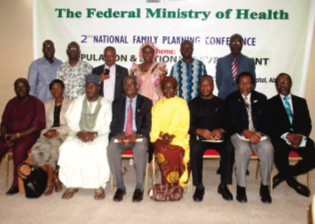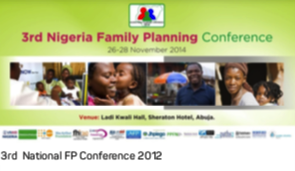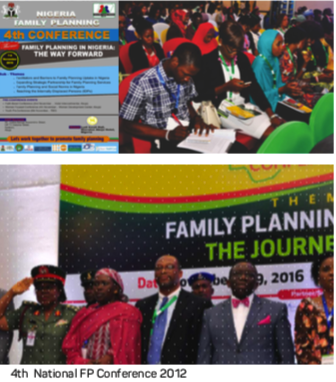The Nigeria Family Planning Conferences
THE MAIDEN NIGERIA FAMILY PLANNING CONFERENCE
| Date & duration | 20th – 22nd November, 2010 |
| Main theme | Strengthening Family Planning for National Development |
| Location | Sheraton Hotel, Abuja |
| Participants | More than 400 |
The Federal Ministry of Health (FMOH) collaborated with development partners, donors, and other stakeholders seeking to change the FP landscape, to plan and implement the first Nigeria Family Planning Conference in 2010. It was sponsored by the Packard Foundation, the Society for Family Health (SFH), the UK Foreign, Commonwealth And Development Office- FCDO (formerly DFID), the Gates Foundation, and the United Nations Population Fund (UNFPA). The conference also received support from Pathfinder International, Jhepiego, and the Health Reform Foundation of Nigeria. The theme was Strengthening Family Planning for National Development.
The maiden conference held at Sheraton Hotel in Abuja from 20th – 22nd November, 2010. With Advocacy Nigeria serving as the
organising secretariat, the conference brought together more than 400 delegates, including representatives from all 36 states and the Federal Capital Territory. There was broad and active participation from diverse sectors including the Ministries of Health, Women Affairs, Budget and Planning, and the National Primary Health Care Development Agency (NPHCDA); Members of Parliament and MDG focal persons, NGOs, Community-Based Organisations (CBOs), Faith-Based Organisations (FBOs), academics and the Media. Stakeholders attending the meeting acknowledged the increasing demand for FP services even in the traditionally conservative States. A major fallout of the conference was the commitment of government to commence the provision of free FP services in all public sector facilities.
Pre-conference sessions took place on Day-1, Monday, 22nd November, 2010. The first was a morning session which featured the Packard Foundation Grantees Meeting and Dissemination organized by the David & Lucile Packard Foundation. The afternoon session was a Book Launch organized by UNFPA/LOC. The title of the book was “Socio-cultural Aspects of Family Planning and HIV/AIDS in Nigeria” by Professor Lawrence Adeokun and reviewed by Professor Uche Isiugo-Abanihe.
THE 2ND FAMILY PLANNING CONFERENCE
| Date & duration | 27th November – 1st December 2012 |
| Main theme | Population and National Development |
| Sub-themes |
|
| Location | Nicon Luxury hotels Abuja |
| Participants | Close to 600 |
| Pro-conferences | 27th November 2012 Youth focused Civil Society Organisations (CSO) and Non-Governmental Organisations on acess to female condorms (Parkview Hotel, Wuse, Zone 1) New Advocacy Strategies for Family Planning – for state level advocates AFP Adapted Advocacy Tool: SMART Chart – step one (Nicon Luxury hotels Abuja) |

» Highlight
- This 2nd Nigeria FP Conference aimed
to highlight the specific ways family planning can help achieve the Millennium Development Goals (MDGs) and also contribute to the National Transformation Agenda. - The Honourable Minister of Health, Prof. Onyebuchi Christian Chukwu announced
a change in policy allowing the
Community Health Extension Workers (CHEWs) to expand the scope of FP service delivery by including dispensing of injectable contraceptives.
2nd Nigeria Family Planning Conference- November 27th- December 1st, 2012 Conference Communique
Family Planning (FP) has been universally acknowledged as one of the key pillars of Safe Motherhood, largely due to its direct positive im- pacts on the health of the family and consequently the economy of nations as a whole. Evidence abound of how several countries, in particular Asian countries have successfully developed the practice of family planning to improve their families’ social and economic realities.
According to the Nigeria Demographic and Health Survey (NDHS) Report of 2008, Nigeria with a population of over 160 million people has a CPR of 10% and an unmet need for FP at 20%. Similarly, even though Maternal Mortality Ratio has decreased to 545/100,000 live births, it still remains among the highest in the world.
It was based on the realization that delaying to act would be highly detrimental not only to the present generation, but also to future ones that the Federal Ministry of Health in collaboration with the Family Planning Action Group(FPAG) as a follow up to the 1st Nigeria FP Con- ference held in 22nd- 24th November, 2010, organized the 2nd Nigeria Family Planning Conference. This 2nd Conference which had as its theme
– Population and National Development was held at the Nicon Luxury Hotel, Abuja from 27th November – 1st December, 2012.
A pre-conference activity focused on youths was also held at the Parkview Hotel, Abuja on 27th November, 2012. A total of 559 participants comprising representatives from all States of the Federation, donors, development partners, religious/traditional leaders, Civil Society Organizations (CSOs), the Academia, Researchers, Women and Youth organizations, Professional Associations, Private Sector, Media, Trade Unions, members of the uniformed forces, journalists and representatives of government ministries and parastatals participated in the conference.
The conference was declared open by the Honourable Minister of Health, Prof. Onyebuchi Christian Chukwu, and the keynote address – Population, Family Planning and Development delivered by the Chairman National Population Commission, Eze Festus Odimegwu. Other notable personalities include the Sultan of Sokoto, His Eminence Alhaji Dr Mohammed Sa’ad Abubarkar III, CFR, mni, represented by Sarkin
Yarki Gaji, Alhaji Sani Umar Jabbi and the President, Christian Association of Nigeria, Pastor Ayo Oritsejafor, represented by the Executive Secretary Nigerian Christian Pilgrims Commission, John Kennedy Opara.
As part of the conference, a book on – Population Dynamics in Muslim Countries :Assembling the Jigsaw, was reviewed by Prof. Ibrahim Na’iya Sada, Deputy Vice Chancellor, Ahmadu Bello University, Zaria and launched by the Hon Minister of State for Health, Dr. Mohammed Ali Pate represented by the Director Family Health Department – Dr. Bridget Okoaguale. In addition, the Lancet Journal special edition on FP was launched by Prof. Oladapo A. Ladipo.
Recognising that a robust FP program will reduce unintended pregnancies and maternal mortality and morbidity, the participants agreed on the following:
- Reaffirmed that promoting knowledge and use of modern contraceptives would not only reduce maternal mortality (especially fromunsafe abortion) and child mortality by 25-30% (MDGs 4 and 5), but will also serve as a key indicator for national development
- Reiterated that actively involving men in FP crusade, starting of Early Family Life Health Education at PHC for mothers with childrenunder 1, Girl-Child education, Natural FP as an integral part of the national FP program, more investment in integrated services,
involvement of media on FP issues amongst others as the way forward
- Agreed that strengthening religious/traditional leaders resolve to support FP is essential for a successful FP program
- Committed to active involvement of the private sector providers in increasing access to FP services
- Emphasized that commitment of government at all levels – Federal/State/LGA is necessary to achieve success
- Acknowledged the effort of the present administration of making FP services free in all public health facilities, the $3millioncommitted to FP for every year for the 4 years of administration, the additional $8.3million pledged to procure RH/FP commodities
and resources and the recent change in policy to allow CHEWs provide injectable contraceptives
- Expressed concern that although the government provided some funds for FP, it still falls short of what is required
We have therefore resolved that the following actions be taken:
- Promote education for all, at least to Senior Secondary School level as a tool for development in all ramifications particularly girl-child education.
- Increase knowledge on the health benefits of FP
- Support investment in FP as a national priority and sustain the free contraceptive policy of the FGN
- Sign the National Health Bill to help fund primary level care services
- Increase the annual budget for FP and ensure FP program is fully funded by all the three tiers of Government by 2020 to enhance sustainability
- Implement the current plan of National Population Commission (NPopC) of generating national data that will enable evidence-based planning
- Review SRH/FP policy to ensure inclusion of groups with special needs such as persons with disability
- Partner with journalists rather than participation. A more sustainable way to do this is to integrate FP into curricula of training institutions of mass communication
- Increase the Sponsorship or writing of articles in the media with the involvement of stakeholders in the field of FP
- Increase positive reporting of FP and other reproductive health issues by the media Integrate FP messages into existing community structures e.g. CDC serving as advocacy for change
- Make local production of FP commodities governments’ top priority
- Establish with local Pharmaceutical companies, WHO certified production plants for the production of drugs including FP commodities
- Ensure that supply meets demand of FP services at all levels through continuous effort by all stakeholders
- Disseminate regularly FP messages and support uptake of these services by religious groups
- Strengthen Public-Private-Partnership (PPP) in FP program
- Increase access of youth to FP information, services and FP/RH commodities
- Strengthen the integration of FP with all reproductive health programs including HIV&AIDS Registration of a national association or agency to be the main driver of FP
- Ensure follow-up of the implementation of these recommendation by FPAG
- Incorporate FP services into the National Health Insurance Scheme (NHIS)
THE 3RD FAMILY PLANNING CONFERENCE
| Date & duration | 26th to 28th November 2014 |
| Main theme | Bridging The Gap Between Knowledge and Practice of Family Planning in Nigeria |
| Sub-themes |
|
| Location | Sheraton Hotel, Abuja |
| Participants | 569 delegates |
| Pro-conferences | Youth Pre-Conference on November 25, 2014, at Reiz Continental Hotel Abuja |

» Highlight
A key highlight of the Conference was the launch of three national reproductive health policy documents by the representative of the Supervising Minister of Health, Minister of State for Health Dr. Khaliru Alhassan, represented by Dr. Wapada Inuwa Balami, Director, Family Health Department of the Federal Ministry of Health:
- The Nigeria Family Planning Blue Print (Scale –Up Plan)
- National Long Acting Reversible Contraceptive (LARC) Strategy
- Global Programme to Enhance Reproductive Health Commodity Security (GPRHCS) Survey Report
THE 4th FAMILY PLANNING CONFERENCE
| Date & duration | 7th – 9th November, 2016 |
| Main theme | FAMILY PLANNING IN NIGERIA: THE JOURNEY SO FAR |
| Sub-themes |
|
| Location | Sheraton Hotel, Abuja |
| Participants |
983 |
| Pro-conferences |
|

» Highlight
Official launch of three reproductive health and family planning documents and the Lancet Maternal Health Series by the Honourable Minister of Health, Professor Isaac Adewole, who observed that the Lancet series is a “must-own document for everybody.” The documents launched include:
- The Lancet Maternal Health Series (Nigeria)
- The Christian Perspective on Reproductive Health and Family Planning
- Trends in Reproductive Behaviour in Nigeria 2003-2013
- The Revised Islamic Perspectives on Reproductive Health and Family Planning.